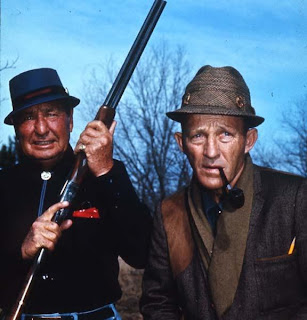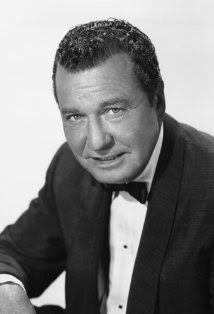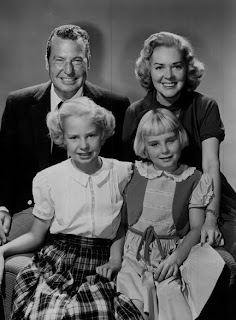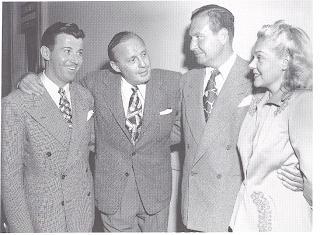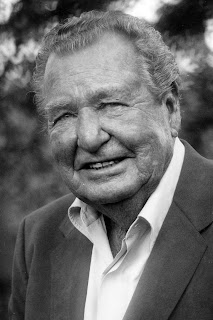Though successful as an orchestra leader, Harris is remembered today for his recordings as a vocalist, his voice work in animation and as a pioneer in radio situation comedy, first with Jack Benny, and then in a series in which he co-starred with his second wife, singer-actress Alice Faye, for eight years. Harris was born in Linton, Indiana but grew up in Nashville, Tennessee, and identified himself as a Southerner (his hallmark song was "That's What I Like About the South"). His upbringing accounted for both his trace of a Southern accent and, in later years, the self-deprecating Southern jokes of his radio character. The son of two circus performers, Harris' first work as a drummer came when his father, as tent bandleader, hired him to play with the circus band. Harris began his music career as a drummer in San Francisco, forming an orchestra with Carol Lofner in the latter 1920s and starting a long engagement at the St. Francis Hotel. The partnership ended by 1932, and Harris led and sang with his own band, now based in Los Angeles. Phil Harris also played drums in Henry Halstead Big Band Orchestra in the mid 1920s.
In 1931, Lofner-Harris recorded a couple of records for Victor, then he recorded a couple of records for Columbia in 1933. In 1935, he recorded a couple of records for Decca. From December, 1936, through March, 1937, he recorded 16 sides for Vocalion. Most were hot swing tunes that used a very interesting gimmick; they faded up and faded out with a piano solo. These were probably arranged by pianist Skippy Anderson. On September 2, 1927, he married actress Marcia Ralston in Sydney, Australia; they had met when he played a concert date.The couple adopted a son, Phil Harris, Jr.(1935-2008), but they divorced in September, 1940.
Harris and screen beauty Alice Faye married in 1941; it was a second marriage for both (Faye had been married briefly to singer-actor Tony Martin) and lasted 54 years, until Harris's death. Harris engaged in a legendary fist fight at the Trocadero nightclub in 1938 with RKO studio mogul Bob Stevens over Faye, after Stevens ended a romantic relationship with her in favour of Sharon Gunn. In 1942, Harris and his entire band enlisted in the U.S. Navy and they served until the end of World War II. By 1946 Faye had all but ended her film career. She drove off the 20th Century Fox lot after studio czar Darryl F. Zanuck reputedly edited her scenes out of Fallen Angel (1945) to pump up his protege Linda Darnell. Originally a vehicle for big bands, including Harris' own, The Fitch Bandwagon became something else entirely when Harris and Faye's family skits made them the show's breakout stars. Coinciding with their desire to settle in southern California and raise their children (Alice Jr., born 1942, and Phyllis, born 1944) without touring heavily, the Bandwagon name disappeared when Fitch yielded to Rexall as sponsor in 1948, and the show was renamed The Phil Harris-Alice Faye Show.
By that time, it had become a full-fledged situation comedy featuring one music spot each for Harris and Faye. The Phil Harris-Alice Faye Show ran until 1954, by which time radio had all but succumbed to television. (Harris continued to appear on Jack Benny's show, along with his own, from 1948 to 1952.) Because the Harris show aired immediately after Benny's on a different network (Harris and Faye were still on NBC, whereas Benny jumped his show to CBS in 1949), Harris would only appear during the first half of Jack's show; he would then leave the CBS studio and walk approximately one block to his own studio down the street, arriving just in time for the start of his own program. He was succeeded as Benny's orchestra leader in the fall of 1952 by Bob Crosby.
Harris had once become so significant a comedy presence on the Benny show that the actual band conductor was arranger Mahlon Merrick. After the show ended, Harris revived his music career. He made numerous guest appearances on 1960s and 1970s TV shows, including the Kraft Music Hall, The Dean Martin Show, F Troop, The Hollywood Palace and other musical variety programs. He appeared on ABC's The American Sportsman hosted by Grits Gresham, and later sports announcer Curt Gowdy, which took celebrities on hunting, fishing or shooting trips around the world. Harris was also a close friend and associate of Bing Crosby and appeared in an episode of ABC's short-lived The Bing Crosby Show sitcom.
After Crosby died in 1977, Harris sat in for his old friend doing color commentary for the telecast of the annual Bing Crosby Pro-Am Golf Tournament. Harris said of Crosby's death, "I have grown up to learn that God doesn't make mistakes. Today, I'm beginning to doubt that." An old episode of The Phil Harris-Alice Faye Show began with Harris telling the story of how he once won the tournament. Harris was a longtime resident and benefactor of Palm Springs, California, where Crosby also made his home. Harris was also a benefactor of his birthplace of Linton, Indiana, establishing scholarships in his honor for promising high school students, performing at the high school, and hosting a celebrity golf tournament in his honour every year. In due course, Harris and Faye donated most of their show business memorabilia and papers to Linton's public library.
Harris died of a heart attack in Palm Springs 1995 at age 91. Alice Faye died of stomach cancer three years later...
